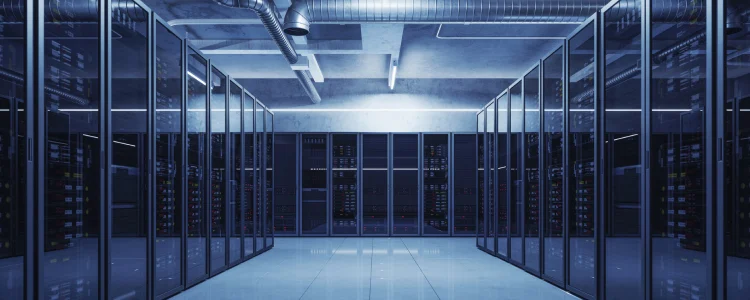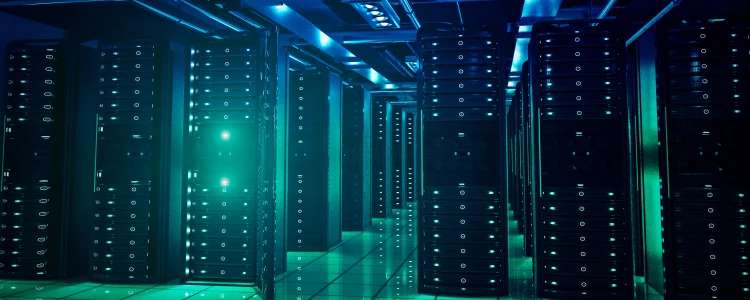What is a Bare Metal Server and How Does It Work?

Bare metal servers have been increasing in demand for quite a while now, with the global bare metal cloud market valued at $5.6 billion in 2021 and projected to reach $56.6 billion by 2031, according to Allied Market Research. But what is a bare metal server?
A bare metal server is a type of cloud service model in which virtual machines are not distributed across several cloud servers but contained on a single dedicated server that isn’t shared with multiple tenants. This allows for higher performance, customization, and security, which can be crucial for some businesses.
For over twenty years, ServerMania has been an expert in bare metal dedicated server hosting, helping businesses stay competitive with cutting-edge hardware and management services.
In this article, we’ll go in-depth and explain what a bare metal server is, why you may need one, how they differ from cloud servers, and common uses for bare metal servers.
What is a Bare Metal Server?
To put it simply, the term bare metal server means a physical server dedicated to a single tenant. Unlike shared hardware or cloud services, where the physical hardware is shared among multiple clients, bare metal servers offer direct access to all of their hardware resources without any virtualization. That means the server’s full processing power, memory, and storage capacity are all exclusively available to you, allowing for better stability, high performance, and security.
Bare metal servers are often used for applications that demand high levels of consistent performance, such as databases, high-traffic websites, and specialized applications like gaming servers or big data analytics platforms. Clients are able to pick and choose their operating system, software configurations, and hardware specifications to fit the exact needs of their project instead of configuring a cloud environment where they may be locked into a vendor’s workflows.
Using a bare metal server offers several benefits, including:
- Better Performance – Without the overhead created by hosting virtual machines, bare metal servers provide direct access to physical hardware, offering maximum performance.
- Improved Consistency – Bare metal environments deliver more predictable and consistent performance compared to virtualized servers, thanks to access to hardware resources.
- Security – Because these servers are dedicated to a single tenant, they have complete control over their entire IT infrastructure, giving them better control and configurations for their needs.
- No “Noisy Neighbor” Effect – Since they’re not running on shared hardware, bare metal servers can’t be impacted by the activity of another tenant on the same physical hardware.

Bare Metal Servers vs. Cloud Servers
It’s no surprise that cloud solutions are popular, as they offer an easy way to provision and deploy without managing physical servers. However, there are many situations where multi-tenant cloud servers aren’t the optimal solution, opening the door for bare metal cloud servers as an option to still host your application in the cloud. There are a ton of factors you should consider when looking to compare bare metal servers to typical cloud services.
Performance
If you need high-performance computing, bare metal servers are the best option available. You can deliver more consistent and predictable performance because you have access to their physical hardware resources. On the other hand, cloud servers can offer great performance, too, but they still have overhead from running virtual machines and can suffer from the “noisy neighbor” effect in a shared environment. This is when one of the tenants places such a load on computing resources that it begins to degrade another tenant’s performance.
Scalability
Unfortunately, one of the biggest downsides of using bare metal servers is that they’re unable to scale at the same rate as cloud servers. Without multiple bare metal servers, you’ll need to constantly upgrade existing hardware, which can take a long time to do correctly. Conversely, a cloud provider is able to spin up multiple virtual machines across any number of cloud servers to scale up as needed instantly.
Cost Savings
Generally, setting up a bare metal server has a higher upfront cost for hardware and setup within a data center if you don’t purchase through a dedicated server reseller. However, in the long term, they can end up being more cost-effective thanks to their predictable pricing. Unlike bare metal servers, though, cloud servers operate on a pay-as-you-go model, which is more effective for unpredictable workloads. The caveat to this is that costs can easily escalate when more computing resources are needed.
Customization and Control
Most cloud providers only allow users to configure software options within their servers, locking you out of custom hardware options in favor of predetermined servers. With bare metal servers, you’re able to have full control over both its hardware and software (such as operating systems) from start to finish. They allow you to customize and put together a physical server that can meet specific performance or application requirements with ease.
Security and Compliance
Security is paramount for both bare metal and cloud servers. Cloud providers offer safe environments and invest heavily in security measures at the cost of less control over some aspects, plus the added risk of using shared resources. Bare metal servers offer a higher level of security and isolation because of their single tenant. That makes them excellent choices for handling sensitive data and complying with regulations.
Deployment Time
One of the biggest advantages of cloud over physical servers is that they can be spun up almost instantly, allowing for rapid provisioning of new ones as your needs change. Bare metal generally takes much longer to deploy, as it often needs to be physically assembled and configured to your requirements.
Maintenance and Management
Cloud providers are responsible for maintaining their own hardware, including all of the underlying infrastructure. However, operating a bare metal server requires hands-on management, including hardware maintenance, software updates, and security patches. This means you’ll need to have IT staff that can manage your server or pay for managed service through your provider.

When to Choose Bare Metal Servers
Depending on the unique needs of your business or application, choosing a bare metal server over a standard cloud provider or your own dedicated servers can be an excellent option. However, they also come with significant upfront costs and aren’t as easy to set up compared to other options. Before choosing between options, here are some questions you should ask yourself first:
What are my performance requirements?
You should assess your organization’s and applications’ needs before making any purchases. Bare metal servers are your best bet if you need high performance and dedicated resources. On the other hand, if you’re starting small and looking to scale up later, using a virtual machine on a cloud server may be a better option.
Do I need full control of my server’s hardware and software?
Consider whether or not you have complete control over your server environment, such as picking specific hardware configurations and operating systems or having root level access. This can be especially relevant for applications with intensive workloads or if you need enhanced security.
Will my workload benefit from a dedicated server?
It’s very possible that your organization may need its own dedicated hardware to run at its maximum efficiency. Running mission critical applications in the cloud where there’s a risk of multiple users being affected by someone else’s workload can cause significant issues, which can be solved with bare metal.
What are my requirements for server uptime and reliability?
As we stated above, running critical software in the cloud can run the risk of interrupted services, thanks to other tenants. Whether you opt for a cloud environment or dedicated bare metal servers, you should ensure your provider’s service level agreements match your needs.
Do I have the technical expertise to manage a bare metal server?
Though it may seem silly, you should assess to make sure you have the in-house expertise to properly manage and maintain a bare metal server. If you aren’t opting for managed services, you’ll need to account for software updates, security patches, and hardware issues, on top of regular maintenance.

Selecting the Right Bare Metal Server
Selecting the right bare metal server infrastructure is incredibly important to ensuring you’re getting the most bang for your buck. When it comes to bare metal servers, your hardware options can make a significant difference in both cost and performance.
- CPU/Processor – Consider the type, the number of CPU cores, and threads. High performance CPUs, like 16 core dedicated servers, are crucial for intensive workloads, while more lax applications may be able to work with different components.
Check out our AMD Ryzen 9 7950X dedicated servers with incredible processing power.
- RAM – You should assess the amount and type of memory needed for your organization. Larger, faster memory can significantly improve performance for applications like databases and in-memory processing.
- Storage – When considering bare metal offerings, weigh your options for HDD vs. SSD, storage capacity, and storage speed. SSDs can offer faster data access times and are great for I/O-intensive applications, but HDDs offer a better price for storage sizes at the cost of a shorter lifespan.
- Networking configurations – Analyze your bandwidth and network speed requirements when looking at any service provider. You should also be looking into both internal and external traffic demands to ensure you’re meeting your needs. In some cases, unmetered dedicated servers might be the right choice for your business.
You should analyze your application’s performance needs, such as processing power, memory, and I/O operations, to determine your hardware needs. You should also consider options if you think you’ll need to scale up in the future by opting for better hardware to meet demand.
Another significant part is to properly vet the data center you choose to host your hardware. Not only do you want to look into their security standards and certifications, but you also want to look into other factors like location, networking components, and whether or not they fit industry regulations.
These can also be applied to your service provider, as you’ll want to ensure they’re equipped to manage your dedicated server to meet your needs. Look for providers that offer high uptime within their service level agreements and whether or not they offer managed services for your hardware or network, in case you don’t have the in-house expertise.
Final Thoughts
Dedicated servers are nothing new, existing essentially as long as the internet has. The surge of popularity for cloud services was a massive change for the tech industry, but it still comes with its drawbacks. Dedicated server costs for a small business can be expensive.
Bare metal servers offer businesses a safe, secure, single tenant solution. They offer better performance, less security risk, higher uptime, and can be customized to fit specific needs. If you’re looking to upgrade your infrastructure, book a FREE consultation with one of our experts today.
Was this page helpful?

